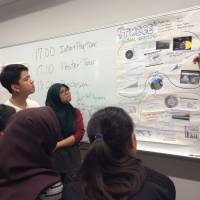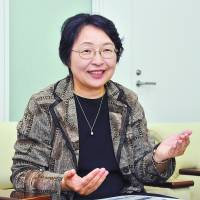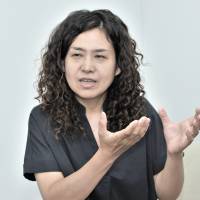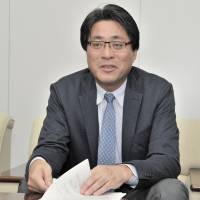Sophia University in Tokyo was selected by the Ministry of Education, Culture, Sports, Science and Technology (MEXT) as one of 11 subsidy recipients for participation in the Association of Southeast Asian Nations (ASEAN) International Mobility for Students (AIMS) Program in 2013. Since then, Sophia University has seen more than 100 outbound students and more than 60 inbound students participate in exchanges with ASEAN member states.
AIMS was initially piloted in Malaysia, Indonesia and Thailand and has been developed into an ASEAN-wide program including Japan as its extended member country. Southeast Asian Ministers of Education Organization — Regional Centre for Higher Education and Development serves as the secretariat.
"It has been a great honor for us to be part of such an international network as one of the universities representing Japan," said Miki Sugimura, Sophia vice president for Global Academic Affairs.
Students have participated in exchanges under the Sophia AIMS (SAIMS) Program. Seven universities in Indonesia, Thailand, the Philippines and Malaysia invite Sophia students to join local students and study in diverse faculties they have to offer.
The SAIMS Program offers a wide selection of subjects mainly in social sciences, engineering and Japanese language, in addition to a compulsory course titled Introduction to Trans-Disciplinary Human Development. This course aims to enhance the connection among different areas of expertise in order to deepen knowledge and discussion on key issues. Such issues include human dignity, human rights, social justice, inclusion and sustainable development.
"We have especially focused on environment issues because they span many fields and should be discussed from various perspectives," Sugimura said. Sophia University's diverse specialties offered in its nine faculties and 29 departments help students gain cross-disciplinary understanding.
The classes offered in the one-semester SAIMS program are open for other students at Sophia, in order to foster dialogues among diverse students groups. The Sophia-Nanzan Latin America Program is another ongoing student exchange project with six Latin American countries that is also sponsored by MEXT. Participants in the two programs interact in various situations, as a means to create diverse and comparative learning environment.
"It is great to see all of these students learning and holding discussions together. The SAIMS program has become a platform for study and friendship at the same time. We call it a connecting hub not only for students, but also for all the teachers who are involved," Sugimura said.
"Participating universities have also experienced various changes through the program. For example, Indonesia's Bogor Agricultural University set up a curriculum in English for international students when it was decided that one of our students would attend the university through SAIMS. We were greatly touched by their passion, and the student was highly motivated throughout the program," she added.
On the other hand, there are hurdles that students themselves have to clear.
"Japanese students are often shocked by the English language and communication skills, as well as the leadership, of exchange students from ASEAN countries, which is a great opportunity for them to realize the level of global standards," said Mikiko Michelle Sugiura, associate professor in charge of four SAIMS courses.
The students not only study in classrooms, but also interact with the people around them and experience how they live. "People-to-people connectivity is what we emphasize," said Yasushi Hirosato, professor of the Faculty of Global Studies and the Graduate School of Global Studies.
Hirosato is the director of the Sophia ASEAN Hub Center, which is located at the Faculty of Political Science at Chulalongkorn University in Bangkok. Sophia University has several other overseas offices, but he pointed out that this one is especially important and unique.
"While ASEAN member states and Japan maintain friendly and stable relationships, there is so much dynamism in their economies and societies. We are also geographically close to each other and there is so much more we can do together," Hirosato said.
ASEAN countries have the broad understanding for the diversity of ethnicity, culture, religion and gender that Japan lacks. On the other hand, some of them are currently going through the socioeconomic, political, or environmental changes that Japan has already been through and may use Japan's experiences as a reference.
Sugimura finds that they are much faster to adapt to change than Japan, and their policy-making process is also quick because their societies and economies are vibrant and still growing. "It is also noteworthy that more women are taking on leadership roles in ASEAN member states compared to Japan," said Sugiura.
Unfortunately, 2017 will be the final year for the MEXT's five-year subsidy for supporting the SAIMS program. However, Hirosato and other academic staff who have been engaged in the program are firmly determined to continue and strengthen the relationships they have built among the participating universities.
"Thanks to the government's support, we were able to create strong partnerships with leading universities in the ASEAN member states. The source of the support is public funding, so we want to return something to society at large," said Hirosato.
"We believe there are ways to enhance the relationships further; the halal cafeteria that recently opened on campus provides opportunities for both domestic and international students at Sophia University to interact with and understand more about Islamic culture. Additionally, we can try expanding the focus of our trans-disciplinary studies from the environment to other topics, such as migration, to include more diverse students in discussions," Sugimura said.
As the name suggests, the Sophia ASEAN Hub Center can serve as the connecting hub for communities within and centered around ASEAN member states to achieve further and deeper collaborations within the network.
As the former principal education specialist at the Asian Development Bank, Hirosato has rich experience in working with people from ASEAN member states, and he is fully committed to use his knowledge and experience in expanding the projects that the Sophia ASEAN Hub Center has been carrying out. These include organizing study tours and symposiums, arranging internships, supporting joint research on environmental issues and building partnerships with universities and international organizations in Bangkok, just to name a few.
Sophia University is planning to start the Sophia English-medium Education Program. This program hopes to offer more opportunities for students to learn and discuss topics, such as sustainable development, that are also among the top concerns for ASEAN countries.
Sophia University expects that this program will attract more students from ASEAN and create lively exchanges of ideas. "Bilateral discussions sometimes become too direct and cause friction. There are situations where multilateral communication works better. The ASEAN member states are diverse in many ways and can bring well-balanced and flexible ideas into tense discussions," Sugimura said.
"There are risks and benefits in everything. Through working together based on equal partnership, we want all our inbound and outbound students to experience managing risks and gaining benefits in order to return something to society. Such experience will help build confidence in the students who will shape the future of ASEAN and Japan," Sugiura said.
To witness the future success of the participants of the SAIMS exchange program is the shared goal for everyone involved.
Indeed, past SAIMS participants successfully landed international jobs bridging Japan and ASEAN. One of them is working at a Thai branch of a Japanese business consulting company.
Another is doing internship at a Japanese real estate company, Sekai Property, in Malaysia that deals with clients and properties in Japan, as well as Malaysia, and employs Japanese.
"I'm planning to further my studies in Tokyo and possibly work there in the future," he said.

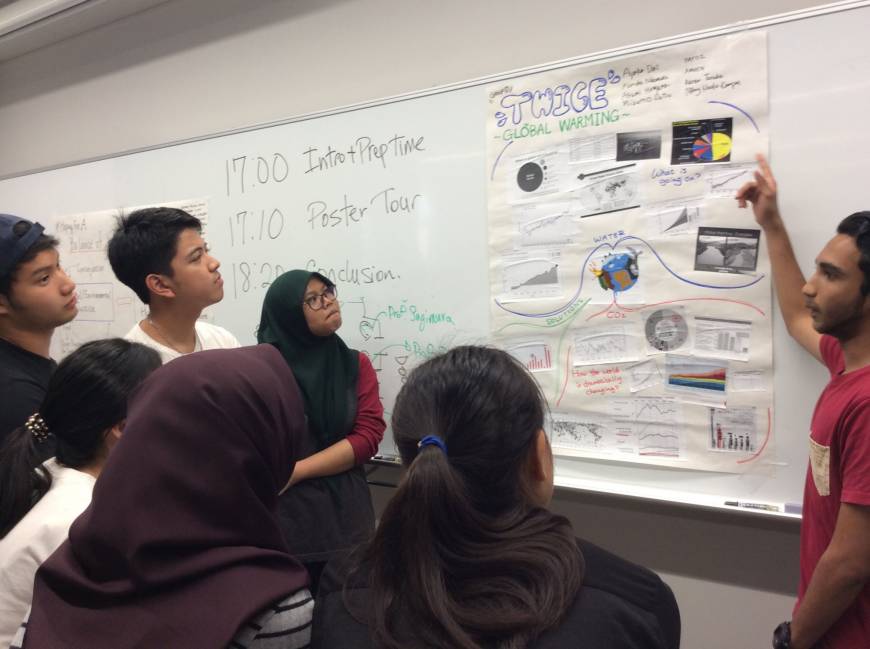
 Click to enlarge
Click to enlarge
